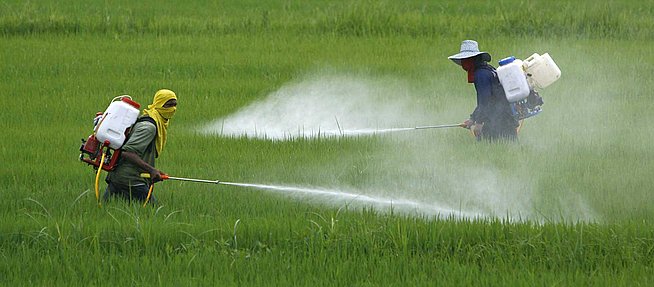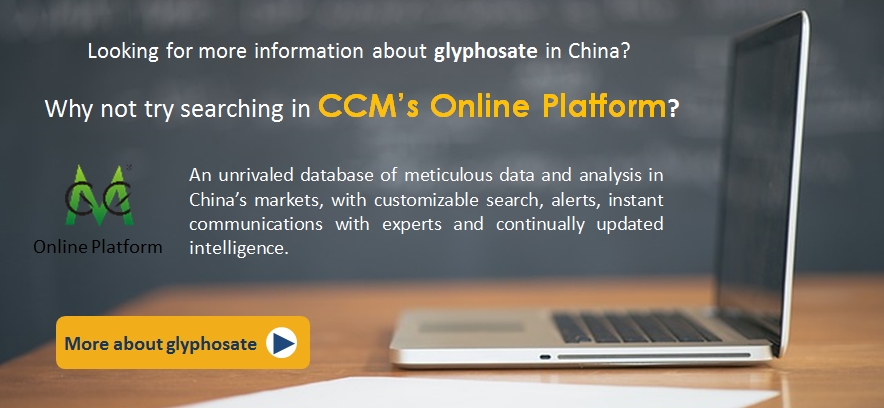Paraquat AS will soon exit the Chinese market on 1 July, 2016. As two most
potential substitutes for paraquat, glyphosate and glufosinate-ammonium are going
to compete against each other for market shares left by paraquat AS. So will
glyphsoate lose out to glufosinate-ammonium?

Source: Baidu
Given that paraquat AS is about to be banned in China, some industry insiders
believed that glyphosate will lose out to glufosinate-ammonium when seizing the
market shares left by paraquat. As of now, glyphsoate still plays an important
role in the sterilant herbicide market. Nevertheless, as the problems of
overcapacity, fierce competition among enterprises and resistance of weeds
become more and more obvious, the use of glyphosate is impacted to some extent.
In general, weeds will easy to become resistant to a herbicide that has been
used alone for 3-5 years. Therefore, weeds are showing serious resistance to
glyphosate as glyphosate has been used for decades. Currently, some weeds like
mazus japonicus, common dayflower, youngia japonica, purslane, cudweed herb,
copperleaf, field bindweed and endive are largely insensitive to glyphosate, as a result, to use glyphosate formulations alone cannot
effectively control and prevent them.
Notably, in 2006 and 2010, some Chinese
magazines also reported that Canadian fleabane and Eleusine indica (L.) Gaertn.
were resistant to glyphosate. In fact, some weeds are naturally resistant to
glyphosate, thay are Chinese jute, ammannia, China pink, conyza japonica,
cyperus esculentus, common crabgrass, ipomoea bata, belvedere, knotweed,
Florida calla, hemp sesbania, common chickweed, and black nightshade.

In recent years, glyphosate is losing its advantage, mainly because it is
reported to cause cancer by media. At the same time, it was suspected to be
carcinogenic by the International Agency for Research on Cancer and the
European Food Safety Authority. The public began to worry about the use of
glyphosate, especially when there is growing concern over food safety.
What's worse, the mother liquor generating from glyphosate production pollutes
the environment, which also affects the sale of glyphosate. Particularly, some
enterprises are reported to discharge glyphosate mother liquor illegally in
recent years. This causes negative moods of the public towards the continued use
of glyphosate.
On the contrary, some industry insiders believed that glufosinate-ammonium
cannot beat glyphosate, because the latter won't be eliminated from the Chinese
market in the short run. On one hand, the price of glyphosate TC is about
USD2,731.87/t (RMB18,000/t), vs. USD18,212.45/t (RMB120,000/t) for
glufosinate-ammonium TC.
In fact, when glufosinate-ammonium was promoted in the
market, the huge price gap between it and glyphosate was there. On the other
hand, being marketed for many years, glyphosate has been accepted by farmers.
Therefore, this will be an obstacle for the promotion of glufosinate-ammonium.
Furthermore, being mixed with other herbicides revitalizes glyphosate. Some
obstinate weeds can be control and prevent and the weeding efficacy can be
improved by using mixed formulations of glyphosate. Nowadays, glyphosate is
mainly mixed by MCPA, dicamba, 2,4-D, fluoroglycofen-ethyl, oxyfluorfen,
bensulfuron-methyl, triclopyr, fluroxypyr, fluazifop-P-butyl and
pyraflufen-ethyl. These mixed formulations all sell well in the market.
This article comes from Glyphosate China Monthly Report 1606, CCM

About CCM:
CCM is the
leading market intelligence provider for China’s agriculture, chemicals, food
& ingredients and life science markets. Founded in 2001, CCM offers a
range of data and content solutions, from price and trade data to industry
newsletters and customized market research reports. Our clients include Monsanto,
DuPont, Shell, Bayer, and Syngenta. CCM is a brand of Kcomber Inc.
For more
information about CCM, please visit www.cnchemicals.com or get in touch with us
directly by emailing econtact@cnchemicals.com or calling
+86-20-37616606.
Tag: paraquat glyphosate